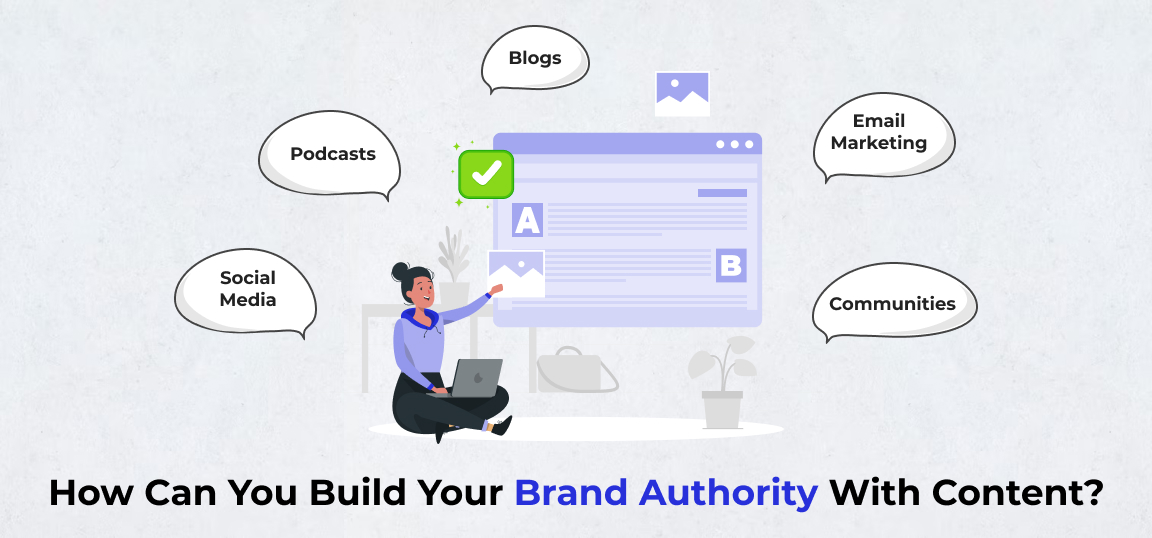
From Content to Credibility: Building Brand Authority Effectively
by Nida DanishWhat is Brand Authority and Why Does it Matter?
The concept of brand authority is used to describe a brand’s level of expertise, reliability, and influence within a given industry.
When a brand is respected, consumers trust its advice, which creates dedicated supporters. This trust helps maintain the brand’s good reputation, which promotes long-term success.
Customers are more likely to stick with a brand they believe in, refer their friends to it, and overlook any flaws.
The Significance of Quality Content
“The Content Marketing Institute reports that 73% of B2B marketers and 70% of B2C marketers use content marketing as a component of their overall marketing strategy.”
Quality content does amazing things for a brand! It boosts engagement, visibility, and credibility in the industry. It’s like the foundation of a brand’s authority.
Imagine your favorite brand sharing valuable and informative content that speaks directly to you – wouldn’t that make you trust them even more?
When brands consistently create valuable and relevant content, they connect better with their target audience. This kind of content sparks discussions and gets people talking online, giving the brand more visibility in its industry.
To make this work, brands need to understand their audience, plan their content well, and make sure it’s accurate and relevant. By doing so, they can become industry leaders and succeed in the digital world.
In short, great content is one of the key factors in a brand’s success and making a mark in the competitive digital landscape.
- Building Trust and Credibility: By demonstrating expertise and trust through quality content, businesses stand out in a competitive market and become experts in their field, leaving a lasting impression. It engages the audience, reinforces the brand’s expertise, and attracts industry peers, influencers, and media.
- Igniting Audience Interaction: By addressing customer pain points, challenges, and interests, businesses create a positive user experience and provide valuable insights. By sharing industry tips and best practices, businesses attract new leads and become pioneers in their field.
- Amplifying Brand Visibility: A smart content strategy boosts website authority and visibility, allowing brands to reach their target audience. This traffic not only contributes to brand visibility but also converts visitors into customers.
- Traffic, Engagement, and Conversions: Businesses that provide relevant content throughout every customer’s journey form a strong connection with potential buyers, forming a long-term relationship. Engaging content sparks discussions, creating a virtual community of like-minded individuals and deepening the bond between the brand and its audience, leading to increased brand loyalty and repeat business.
How Top Brands Built Credibility through Powerful Content
A select group of brands have mastered the art of creating long-lasting and significant brand authority in the constantly changing world of modern marketing. These brands have distinguished themselves from the competition by launching strategic content campaigns that go beyond simple product promotion.
We examine the content strategies of three outstanding companies: HubSpot, Red Bull, and GoPro. Each of these companies uses storytelling, user-generated content, and worthy causes to establish themselves as reputable and influential leaders in their respective fields.
HubSpot
HubSpot is a leader in inbound marketing, providing valuable resources to empower their audience and position themselves as experts.
They offer a comprehensive blog, ebooks, guides, webinars, workshops, and online courses. Their HubSpot Academy offers free online courses and certification programs on inbound marketing, content creation, and social media strategy.
They also engage with their audience on social media, sharing insights and encouraging meaningful discussions. Additionally, they offer podcasts and video content covering various marketing topics.
HubSpot’s content strategy is a masterclass in building brand authority through education and value-driven content, making them a go-to source for marketers seeking guidance and insights in the field.
RedBull
Red Bull uses user-generated content (UGC) to create a dynamic online presence, focusing on extreme sports, adventure, and adrenaline-pumping activities. The brand invites users to submit their content, showcasing creativity and pushing the boundaries of what’s possible.
The site fosters inclusivity and camaraderie, allowing people from all walks of life to contribute. Red Bull also launches interactive campaigns, amplifying user-generated content on social media platforms. The brand’s UGC strategy also involves bringing stories to life, capturing the essence of adventure, and pushing the boundaries of human potential.
This approach transforms the website into a living, breathing showcase of incredible human achievements, reinforcing the brand’s values and resonating deeply with its target audience.
GoPro
GoPro has integrated its product use case with a noble cause, creating a unique and impactful brand identity. GoPro Heroes revolves around the idea that every adventure can contribute to a greater purpose, showcasing individuals using GoPro cameras to capture their journeys.
GoPro encourages users to document their experiences and create purposeful content, partnering with organizations and initiatives aligned with their noble cause. The company also leverages user-generated advocacy, documenting human stories of resilience, determination, and compassion. GoPro actively engages with its community on social media, encouraging users to share their content and stories.
GoPro offers educational resources and workshops to empower users to create impactful content. This strategy drives sales and brand loyalty, inspires positive change, and makes a difference in the world.
Best Platforms For Content Marketing
Content marketing is a flexible strategy that reaches and connects with different platforms. The perfect platforms depend on your goals, target audience, and the kind of content you have. Here are some great platforms to consider:
- Blogs: Blogs are popular content marketing platforms for publishing informative articles, guides, and industry insights, driving organic traffic, establishing brand authority, and engaging with audiences through comments and social sharing.
- Social media: Businesses can reach a large audience and encourage engagement through text posts, images, videos, and stories on social media platforms like Facebook, Instagram, Twitter, LinkedIn, and YouTube.
- Email Marketing: Email marketing delivers personalized content to subscribers, creating leads, building customer relationships, and promoting products or services.
- Video Platforms: Popular video content platforms like YouTube and Vimeo enable businesses to tell interesting stories, showcase products, and connect emotionally with audiences.
- Podcasts: Podcasts are a growing content marketing channel for in-depth discussions, interviews, and thought leadership.
- Infographics and Visual Platforms: Pinterest and Instagram are visual content platforms for captivating infographics and images.
- Ebooks and Whitepapers: Creating and distributing ebooks and whitepapers is an effective strategy for generating leads and establishing thought leadership.
- Community Forums and Q&A Sites: Businesses establish authority through community forums like Reddit and Quora by answering questions and providing insights.
The platforms you use for content marketing depend on your audience, the kind of content you have, and your overall marketing plan. When you combine different platforms in a smart strategy, you can boost brand awareness, increase engagement, and generate more leads.
How to Track and Measure Progress
To make the most of content marketing, businesses should track and measure its impact on their brand’s performance. This helps in making decisions based on data, improving the content strategy, and enhancing their online presence over time. It’s all about continuous enhancement.
- Website Traffic Analysis: For content marketing success, businesses look for more website traffic, and they can track it with tools like Google Analytics. When they see a big increase, especially on pages with lots of content, it means the audience loves the content and is getting interested in the brand.
- Engagement Metrics: Getting the audience engaged is super important for making an impact. We can look at metrics like time spent on the website, bounce rate, and social media interactions to see if the content is relevant and valuable to them. When we see higher engagement rates, it means people are interacting more with the brand.
- Conversion Rates: The goal of content marketing is to boost conversions and sales. We do this by keeping an eye on conversion rates on landing pages, figuring out what content works best, and finding areas where we can make things even better to optimize the conversion process.
- SEO Performance: To see how well our content is doing, we keep an eye on SEO performance. This means checking how our keywords rank and how much organic traffic we’re getting. When we do this, we can tell if our content is valuable and relevant to users. Plus, it helps us improve our rankings and makes our brand more visible.
- Audience Feedback: Audience feedback is super important for knowing how our content is doing. We look at comments, reviews, and social media chats to understand what the audience thinks and what we can do better.
- Social Media Analytics: Social media platforms give businesses lots of data to see how well their content is doing. They can track reach, impressions, click-through rates, and how much engagement they’re getting. You have a complete picture of how the content is performing.
- Brand Mentions and Backlinks: By keeping an eye on brand mentions and backlinks from trusted sources, we can see how the industry perceives our brand. This boosts our authority and credibility, making our brand even stronger.
Conclusion
Remember, building brand authority through quality content is an ongoing process. Continuously assess your audience’s needs, stay updated with industry trends, and adapt your content strategy accordingly.
Invest in creating and distributing valuable content, and you will reap the rewards of a reputed and influential brand.
Embrace the power of quality content and take your brand’s authority to new heights.
Reach us at – [email protected]
- About the Author
- Latest Posts
Formerly an English trainer, a dearth of creativity led me into the world of digital marketing. I now channel my linguistic prowess as a Content Strategist at CueForGood.
3 Replies to “From Content to Credibility: Building Brand Authority Effectively”
Add a comment
-
Jiva’s Organic Traffic Growth: 354% Surge in 6 Months | CueForGood
by Nida DanishSummary: Jiva’s efforts to empower smallholder farmers weren’t gaining the digital traction they deserved. With a strategic overhaul led by …
Continue reading “Jiva’s Organic Traffic Growth: 354% Surge in 6 Months | CueForGood”
-
What We Learned When We Switched From Disposable Tissues to Reusable Napkins
by Nida DanishAt CueForGood (CFG), we’ve embraced a refreshing change: reusable cloth napkins. While the switch may seem minor, it’s rooted in …
Continue reading “What We Learned When We Switched From Disposable Tissues to Reusable Napkins”
-
Of Light, Laughter & Transformation: Diwali 2024 at Cue For Good
by Nida Danish
On any given day, walking into the Cue For Good office feels like stepping into a space with heart. It’s …
Continue reading “Of Light, Laughter & Transformation: Diwali 2024 at Cue For Good”
-
Why PHP Still Matters in 2024: A Look at Its Continued Relevance
by Girish TiwariAt its peak in the early 2010s, PHP powered the majority of websites globally, including major platforms like Facebook and …
Continue reading “Why PHP Still Matters in 2024: A Look at Its Continued Relevance”
-
How Meta’s New Holiday Ad Features Can Transform Your Business This Season
by Charanjeev SinghThis year, Tapcart’s 2024 BFCM Consumer Trends Report suggests that nearly 60% of shoppers kick off their holiday shopping in …
Continue reading “How Meta’s New Holiday Ad Features Can Transform Your Business This Season”
-
Cue For Good’s Journey at the B Corp Festival 2024: Exploring Louder Than Words
by Pancham PrasharOn September 10th and 11th, 2024, I had the incredible experience at the “Louder Than Words” B Corp Festival, held …
Continue reading “Cue For Good’s Journey at the B Corp Festival 2024: Exploring Louder Than Words”









Newgenmax is providing amazon seling, amazon pcc ads, amazon product listing amazon seller training apart from product listing on other ecommerce portals like flipkart etc. For more details visit https://newgwnmax.com
Very HelpFull
This is so helpful and nicely explained